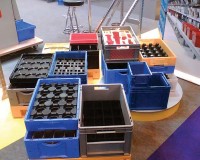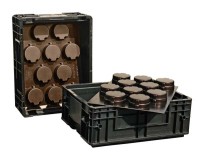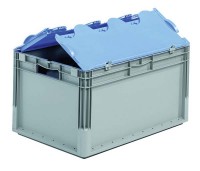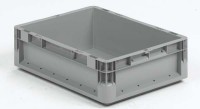 SSI Schaefer’s world renowned expertise in materials handling and storage solutions extends from plastic containers and racking systems to large-scale automated warehouse projects. In recent years SSI Schaefer has been making headline news designing, building and installing automated storage facilities for blue chip names like Budweiser, Carlsberg, Office Depot and TJ Morris. While pressing on with these big contracts across Europe, SSI Schaefer has also been busy building its presence in the Returnable Transit Packaging (RTP) market, with particular emphasis on the multiple grocery sector.
SSI Schaefer’s world renowned expertise in materials handling and storage solutions extends from plastic containers and racking systems to large-scale automated warehouse projects. In recent years SSI Schaefer has been making headline news designing, building and installing automated storage facilities for blue chip names like Budweiser, Carlsberg, Office Depot and TJ Morris. While pressing on with these big contracts across Europe, SSI Schaefer has also been busy building its presence in the Returnable Transit Packaging (RTP) market, with particular emphasis on the multiple grocery sector.
SSI Schaefer has introduced into the UK a new family of folding returnable crates and other plastic containers under the Eco Tec brand. Originally developed in response to a request from a major grocery retailer, these come in a range of different models and sizes to meet retailers’ and suppliers’ needs to keep food fresh over long distances right through to the point of sale, while keeping a close eye on the costs. The Grocery Trader spoke to Bob Jane, SSI Schaefer’s Business Development Manager.
The Grocery Trader – Bob, as Business Development Manager, what does your day to day role involve?
As a member of the team, I’m responsible for meeting customer needs through the promotion of Schaefer’s standard products and evolving innovations. I previously specialised in plastic containers, promoting the use of returnable packaging in new industrial sectors after its initial success in manufacturing. SSI Schaefer was one of the first companies in the business to recognise RTP’s cost saving potential.
GT – How much of your work these days concerns plastic containers and RTP?
RTP still takes up a significant percentage of my time, but we’ve now established a specialist team led by Plastics Products Manager Joe Joyce, who has over 20 years’ experience in the industry.
GT – Are you also involved with automated warehouse projects?
Yes, I get involved in our larger projects, working with customers to identify the best solution. The drive towards automation is strong in all sectors, particularly retail. Returnable containers play a key part: you can’t design automated warehouses without determining what you’re handling and how best to move it. If a client asks to quote for an automated system, we design the most efficient solution, which inevitably involves standard-sized plastic containers and minimising product handling and re-packing.
GT – Can you tell us about the major automated warehouse projects you’ve carried out recently in the UK?
 One of our more recent projects, in terms of full automation and large quantities of returnable packaging, was for TJ Morris’ Home Bargains retail operation in Liverpool. It has 42,000 pallet positions in a high bay warehouse, and supplies 260 UK stores with goods in returnable containers. Standardisation of unit load – the totes and boxes carried – is key in warehouse automation. Security is also vital. At TJ Morris, we have fully automated both the strapping round boxes and the ink jet printing and application of labels on the strapping. We have also carried out projects for Tool Station, involving 250,000 returnable containers, and Office Depot, incorporating various different types of systems, using containers for movement in the warehouse and delivery to stores.
One of our more recent projects, in terms of full automation and large quantities of returnable packaging, was for TJ Morris’ Home Bargains retail operation in Liverpool. It has 42,000 pallet positions in a high bay warehouse, and supplies 260 UK stores with goods in returnable containers. Standardisation of unit load – the totes and boxes carried – is key in warehouse automation. Security is also vital. At TJ Morris, we have fully automated both the strapping round boxes and the ink jet printing and application of labels on the strapping. We have also carried out projects for Tool Station, involving 250,000 returnable containers, and Office Depot, incorporating various different types of systems, using containers for movement in the warehouse and delivery to stores.
GT – Do you produce customer case studies about these projects?
Yes, we do. You can find some case studies on the facing page, and more on our web site.
GT – If anyone reading this happens to be considering investing in an automated scheme, should they contact you in the first instance?
Yes they should, then we can direct the enquiry to the right place. We will respond within 24 hours.
GT – When did SSI Schaefer as it is now, come into being?
We started producing plastic containers in 1969 and have been continually evolving since. In operation for over 50 years in the UK, we are now in an established direction moving forward – our business is now 60% in favour of automation, and 40% is static storage systems.
GT – Where is your global HQ?
Our global HQ is in Germany, but we’ve decentralised and have autonomous businesses in each country. We’re still privately owned by the Schaefer family.
GT – How big are you worldwide?
We operate in 53 countries, and employ 9,000 people worldwide.
GT – What sets the UK apart as a market for SSI Schaefer in the different areas you operate in?
The only real difference is the currency! Seriously, lots of major companies have offices here, especially the big retailers. We have relationships with their UK head offices, which are coming to the fore as they expand into Europe and worldwide. The UK is SSI Schaefer’s biggest division outside Germany.
GT – Where does SSI Schaefer rank in the UK league of suppliers of these items? What about internationally?
SSI Schaefer is probably the UK’s fourth biggest plastic containers supplier but the top three don’t do major projects or racking. Worldwide we’re stronger, because we offer global coverage in areas where our competitors don’t operate.
GT – In 30 seconds, why buy a storage solution from SSI Schaefer?
 We win on major projects because we offer the complete project management and consultancy package, with no need to involve other suppliers. If clients don’t have resources to manage these projects in-house, we can provide it all.
We win on major projects because we offer the complete project management and consultancy package, with no need to involve other suppliers. If clients don’t have resources to manage these projects in-house, we can provide it all.
GT – Where are you based in the UK? Where do you make the plastic containers and racking you sell here?
We’re based in Andover. Our standard products are made in Germany, in three plants.
GT – Can you talk us through the different kinds of standardised packaging products you offer?
We supply 3,100 different types of container, up to 800mm x 600mm footprint. Our range includes traditional containers for storage and picking, transport and distribution, and also folding containers. The key development is lightweight packaging, using less material to carry the same load. We also manufacture a full range of pallet racking and shelving, conveyors and picking systems.
GT – Do you offer specially tailored boxes, trays, cases etc in companies’ colours and to their dimensions?
Yes, we can. We regularly develop new designs and produce injection mould tools for new customer specific products, however initial quantities need to be in excess of 100,000 units. We also develop our tailored solutions for bespoke packaging in- house, and manufacture them in Andover and Germany.
GT – How do you go about developing tailored plastics solutions for individual clients? What are the steps to achieving a tailored plastics solution? How long does it take?
We start with an initial conversation, to arrive at a cost justification – from there we proceed with drawings, samples and then manufacture. The first batch can be ready in six weeks for internal packaging, but a new container could take nine months for the first order to be ready.
GT – You’ve recently introduced a new family of returnable crates under the Eco Tec brand. How did the Eco Tec range come about?
The Eco Tec brand covers a series of products. Eco Tec is a 600 x 400 x 285mm container, which is readily available. It’s a lightweight, collapsible container, based around the standard footprint, which we’ve redesigned for use in different parts of the retail sector. But our really exciting development is Eco Fresh, a range of foldable, lightweight robust containers. The quick and easy folding mechanism allows its volume to reduce by 86% when not in use, opening the way for significant improvements in logistics efficiency. There are five models at present in a wider range of heights, all perforated containers with holes for the grocery industry, allowing for freshness, cleaning and washing. Rather than responding to client requests, we’ve taken the initiative to develop Eco Fresh, and now we’re offering it to the market.
GT – Are they available to everyone?
Eco Tec is readily available in quantities from 10 to 1,000 or more. Eco Fresh is a development project at present in terms of volume production, but we’re looking for major customers to subscribe because of its proven benefits, and expect top retailers to be on board by year-end.
GT – What temperatures can they stand? What products can they be used to move/store?
Eco Tec and Eco Fresh can withstand temperatures from -28ºC (cold stores) to + 80ºC (washing.) They can be used for meat, vegetables, bread, medicines and dry goods, including packaged and loose items.
GT – What business benefits can companies achieve through effective use of returnable containers?
 Maximising use of reusable containers not only improves truck utilisation rates but also significantly reduces the number of costly trips, making the container not only uncomplicated to work with but extremely cost effective and ecologically sound.
Maximising use of reusable containers not only improves truck utilisation rates but also significantly reduces the number of costly trips, making the container not only uncomplicated to work with but extremely cost effective and ecologically sound.
GT – Do you supply returnable packaging to the 3PL’s?
Yes, we regularly supply them to the major logistics operators and the UK box pools, and have done so for many years. We see Eco Tec boxes and crates going the same way: it’s a key project for Joe Joyce.
GT – Plastic boxes and cases takes considerable looking after. Do you supply these items ready tagged?
Yes, in various ways – bar codes can be applied at the moulded stage and RFID tags affixed, offering full order tracing, stock control and asset tracking.
GT – Do you offer reusable packaging in companies’ house colours?
Generally yes, and we can apply logos too.
GT – Besides Eco Tec, what other retail-ready cases, boxes and box pallets do you produce, for use in the supply chain and at the point of sale?
We supply a complete range of returnable containers from stock. We offer attached lidded containers and a full range of Euro size containers measuring up to 600 x 800mm across the base.
GT – Can Eco Tec and your other plastic products be recycled after use?
Yes, they can. In Continental Europe, especially Germany, the original manufacturer has to supply recycling services. We’re increasingly asked to use recycled material, a result of growing Corporate Social Responsibility for greener suppliers: a recent order for a high street retailer requested 100% recycled material. One stipulation is that recycled products must be black or grey, due to the mixture of coloured plastics that make them up! With all the initiatives to recycle, there’s still a shortage of material – as demand grows for recycling, the problem could be the availability of material.
GT – What are the classic ways to minimise warehousing and logistics costs through better use of plastic packaging?
In warehousing, the key is standardising unit loads, as we mentioned before. It’s easier to standardise if using plastic boxes with rigid corners: if a myriad range of cartons is handled, it’s quite normal to see cardboard decanted into plastic or the introduction of trays to handle cardboard. Once that’s achieved, other things can be done – automated filling, dispensing, closing lids, labelling and document insertion. After that stage, we’re looking at ways of maximising the cube in the warehouse and at the transport stage, optimum use of space.
GT – Do you offer a ‘top to toe’ consultancy service to help customers improve their storage and logistics practices?
Yes, we do – we analyse, plan and collect data, offering clients a swift justification as to whether to invest. Our consultation isn’t biased – we’ll say outright if you stand to achieve a return on your investment.
GT – Are you launching any more new storage products in 2011?
We launched lots of new products at the recent CeMAT show. Our new folding KLT container was the first in the market, measuring 600 x 800 x 460mm high, with wheels on. It’s ideal for retail clothing and other non-food applications. Our big launch at the show was the ELB container, a lightweight Eurotainer range, which is available now from stock. We see ELB becoming the mainstay of the industry, and a market leader for standard Euro size containers. You can find full details of our other products on the SSI Schaefer web site. We also launched many other products in automation, including the Auto Cruiser, a conveyor system without rollers, the Order Verifier, able to count and identify the articles of over 6000 items an hour completely automated, and the LogiMat vertical lift system for tray handling and storage.
GT – What warehousing and logistics or food and drink industry exhibitions are you exhibiting at in 2011-12?
 We’ll be at the TCS&D Cold Store Show in Peterborough on 14/15 September, showing displays of our projects in the UK and the Continent in mobile racking and container systems – come and visit us on stand number C16. We also regularly host our own events, inviting customers to come to see an automation site – the next one is on 29 September in Liverpool.
We’ll be at the TCS&D Cold Store Show in Peterborough on 14/15 September, showing displays of our projects in the UK and the Continent in mobile racking and container systems – come and visit us on stand number C16. We also regularly host our own events, inviting customers to come to see an automation site – the next one is on 29 September in Liverpool.
GT – Which firsts has SSI Schaefer introduced, which have changed the way the food and drink industry handles its goods? Have you won any awards for excellence and innovation?
Yes, we have. This year Eco Tec won the GVA ProK Award for innovation in the plastics industry, and Eco Fresh is up for the same award. We’ve won many other awards in the past across our product groups – the Orbiter System, a fairly new product for the UK logistics market that leads the way in providing safer, faster and more intelligent controllable shuttle system technology capable of travelling up to one metre per second, won a safety award. Our bespoke Silent Conveyor has won awards and more recently the world’s fastest picking system, the Schaefer Robo Pick (SRP) was named Best Product 2011 at this year’s LogiMAT trade fair in Stuttgart.
GT – What industry standards are your products made to? How ‘green’ are they?
Our KLT range is designed to the German VDA standard. On environmental savings, returnable packaging takes out packaging waste and in automated installations is most effective in packaging and energy.
GT – Has the recession changed the way companies view major automated storage projects?
We get a much more positive response now to the idea of automation. My earlier comments about standard unit loading still stand – if a customer invests in automation, they will go down that road. In large projects, the automation side takes up two thirds of the conversation, even though the bulk of the equipment we supply is static. The reality is, people have to keep up, invest and reorganise, and prefer to invest in automation rather than workers – again, as mentioned before, we will only recommend a certain approach to automation if the rewards on investment outweigh the initial costs. We’re investing in more qualified people: we’ve raised our game, and have more experienced people coming into the automation side of the business.
GT – Finally, where do you see SSI Schaefer’s grocery industry business going from here?
It’s growing strongly, and will continue to increase significantly. We have strong relationships with multiple grocers, who are developing their business in many areas besides grocery: our conversations go into on-line fulfilment and so on. We’re involved with several multiples on hanging garments and other systems for non-food handling. As the dynamics and trends of food and grocery shopping change, many are opening more local corner-stores, and building new DC’s to service them. This sector is very competitive and a key area, which we are committed to supporting.
Tel: 01264 386618




Comments are closed.